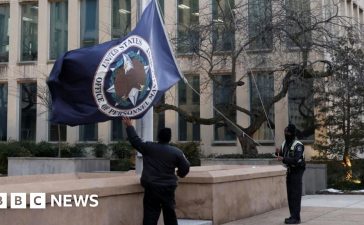An Hour Ago
Australia consumer sentiment stays extremely weak
Australia’s consumer sentiment remained unchanged in February, at a 30 year low of 78.5.
This marks the second consecutive month of “extremely weak consumer sentiment,” said Westpac Melbourne Institute.
“Index reads below 80 are rare, back-to-back reads even rarer. Indeed, both the Covid shock and the Global Financial Crisis saw only one month of sentiment at these levels,” wrote Westpac’s chief economist Bill Evans.
Given Australia’s lower than expected figures for wages, employment and inflation, Evans maintained his forecast of a 0.25 percentage point hike in interest rates in May.
— Lim Hui Jie
An Hour Ago
CNBC Pro: As tech gets hammered, strategists say these stocks present a buying opportunity
The collapse of Silicon Valley Bank has added to the woes of the tech sector, coming hot on the heels of expectations that interest rates are likely to remain high for some time.
But some strategists are doubling down on the sector.
“We think that for medium- and long-term investors, the recent bout of volatility that you’ve seen represents a buying opportunity,” Anthony Doyle, head of investment strategy at Firetrail Investments, told CNBC on Monday.
Pro subscribers can read more here.
— Zavier Ong
An Hour Ago
Oil prices fall as concerns over SVB fallout spreads
Oil prices dipped as the collapse of Silicon Valley Bank continues to reverberate across global markets.
Brent crude futures last traded lower 0.49% to $80.32 a barrel, while the U.S. West Texas Intermediate futures lost 0.6% to stand at $74.35 a barrel.
National Australia Bank expects the prices to drop further following a stronger than expected U.S. inflation data slated for release later.
“Oil prices fall on market fall-out from the US Silicon Valley Bank collapse. A stronger than expected US CPI data report tonight will put further downward pressure to near term prices,” NAB wrote in a daily note.
While energy prices have seen some relief due to diminishing shortage concerns, upside risks remain said Commonwealth Bank of Australia.
“We see upside risks to our outlook driven by a sustained fall in Russia’s oil and diesel exports,” CBA said.
—Lee Ying Shan
3 Hours Ago
Topix declines led by financials, energy and consumer cyclicals
Declines in Japan’s Topix were led by financials, energy and consumer cyclicals on Tuesday’s morning trade, Refinitiv data showed.
The index fell more than 3%, reaching the lowest levels since mid-January – with financials stocks losing more than 6%. Energy stocks saw a loss of 4.26% and consumer cyclicals fell 3.15%.
Basic materials and real estate stocks fell nearly 3%, followed by industrials and utilities.
Based on index points, Toyota Motor Corp shed the most and traded 4.37% lower. Following Mitsubishi UFJ Financial Group and Sumitomo Mitsui Financial Group, Sony Group also shed the most and fell 3.1%.
– Jihye Lee
3 Hours Ago
Singapore financials lead losses on STI; DBS largest loser
Singapore bank stocks were among the top losers on the Straits Times Index on Tuesday, despite a statement from the country’s monetary authority that it has “insignificant exposures” to the banking fallout in the U.S.
Shares of DBS, UOB and OCBC Bank fell 2.2%, 1.24% and 1.81% respectively, with DBS the second largest loser on the STI.
The Singapore dollar also weakened 0.1% against the U.S. dollar, trading at 1.3474.
— Lim Hui Jie
3 Hours Ago
Asia-Pacific banks continue to see losses on SVB fallout
Asia-Pacific banks continued to see sharp falls in Tuesday morning trade.
Japan’s Softbank‘s saw a decline of more than 3% in Tokyo’s first hour of trade as investors continued to weigh concerns over the Japanese investment powerhouse.
Banks also saw sharp losses, with Mitsubishi Ufj Financial Group down 6.92%, SMFG falling more than 7% and Mizuho Financial lower at 7.34% and Nomura falling 4.6%.
3 Hours Ago
South Korean defense company Firstec surges 9% after North Korea fires missiles
Shares of South Korean defense technology firm Firstec jumped over 9%, bucking the sell off seen in the wider market.
Firstec makes components used in South Korean weapon systems like guided munitions and ground combat vehicles.
The stock surge came after North Korea fired two short-range ballistic missiles off its east coast on Tuesday, and as Seoul and Washington conduct their largest joint military drills in five years.
Hanhwa Aerospace, which makes artillery and anti-aircraft systems, also rose 0.63%.
— Lim Hui Jie
3 Hours Ago
China to ease visa restrictions for foreigners
China is set to resume issuing “various” visas for foreigners to enter the country, its embassy in the U.S. said in a Chinese-language notice translated by CNBC.
The changes announced overnight are set to take effect Wednesday Beijing time.
Visas to enter China that were issued before March 28, 2020, will be valid again, and foreigners can enter the mainland visa-free from Hong Kong, among other changes, the notice said.
The statement indicated China would also resume programs that allow citizens of the U.S. and other major countries to visit cities such as Beijing for a few days — without needing a visa. Exact implementation remained unclear.
Mainland China tightened border controls in March 2020 in an attempt to restrict the domestic spread of Covid-19. The country scrapped inbound quarantine requirements in early January.
— Evelyn Cheng
4 Hours Ago
Dollar index at lowest since Feb, Asian currencies mixed
The dollar index was at 103.68, hovering around the weakest level since mid-February,.
Asian currencies traded mixed on Tuesday’s morning, with the New Zealand dollar and the Australian dollar both strengthening to 0.6210 and 0.6651 against the greenback, respectively.
The Japanese yen slightly weakened to 133.24 against the U.S. dollar and the offshore Chinese yuan also weakened to 6.8591 against the greenback.
The Korean won also marginally weakened to 1,297.49 against the U.S. dollar.
3 Hours Ago
U.S. inflation to come in cooler in February, Dow Jones estimates
The U.S. consumer price index for February is expected to come in at 0.4% on a monthly basis or at a 6% annual pace, according to Dow Jones estimates.
This is just slightly lower than January’s inflation data of 0.5% and 6% respectively.
CPI will be the next data point that could provide insight on the Federal Reserve’s move ahead of its meeting on March 21 and 22.
A hot inflation report will raise expectations the Fed could hike rates by 50 basis points, up from the 25 points it implemented in February.
—Lim Hui Jie, Patti Dorm
4 Hours Ago
Singapore says it has ‘insignificant’ exposure to failed U.S. banks
The Monetary Authority of Singapore said its exposure to Silicon Valley Bank was “insignificant.”
“The Singapore banking system has insignificant exposures to these failed banks in the U.S.,” the MAS said in a statement on Monday.
“Banks in Singapore are well-capitalized and conduct regular stress tests against interest rate and other risks,” it said, adding that their liquidity positions are healthy and supported by a “stable and diversified funding base.”
— Jihye Lee
8 Hours Ago
Fed’s Barr to lead review into regulation of SVB
The Federal Reserve’s top regulator will be leading a review into the events leading to the implosion of Silicon Valley Bank, the central bank announced Monday.
Vice Chair for Supervision Michael S. Barr has been tapped for the probe, the results of which will be released to the public May 1. The review will focus on the review and supervision of SVB, which the Fed oversees in its role as a regulator.
“The events surrounding Silicon Valley Bank demand a thorough, transparent, and swift review by the Federal Reserve,” Chairman Jerome Powell said.
—Jeff Cox
15 Hours Ago
Biden says banking system is safe, calls on Congress to strengthen rules after failures
President Joe Biden said Monday that Americans can be confident that the U.S. banking system is safe after regulators scrambled over the weekend to create a plan to backstop deposits at Silicon Valley Bank and Signature Bank.
“Your deposits will be there when you need them. Small businesses across the country with deposit accounts at these banks can breathe easier knowing they’ll be able to pay their workers and pay their bills,” he said in brief remarks Monday before the market’s open.
Biden stressed that no losses will be borne by the U.S. taxpayers. Also, the management of the banks will be replaced and bank investors will not be protected, he said.
Biden also called on Congress to look for ways to strengthen banking rules to prevent these events from repeating.
—Christina Cheddar Berk
3 Hours Ago
CNBC Pro: SVB crisis reveals how tough higher rates can be — but these 3 stocks are resilient, strategist says
Many firms will find a higher-interest-rate environment very difficult to operate in, as demonstrated by the Silicon Valley Bank crisis, said Anthony Doyle, head of investment strategy at Firetrail Investments.
“There will be winners and there will be losers and part of the challenge for investors today is identifying which are those companies that will find this environment much more difficult than they have done in a zero interest rate world,” he said.
Still, he identified three stocks that he thinks look resilient in this new market environment.
CNBC Pro subscribers can read more here.
— Weizhen Tan









